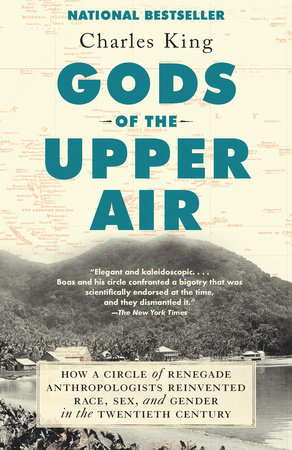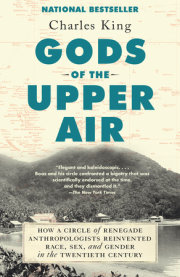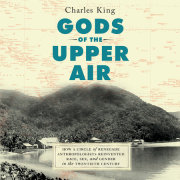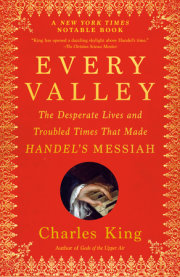Chapter One
AwayOn the last day of August 1925, the triple-deck steamship Sonoma, midway through its regular run from San Francisco to Sydney, slipped into a harbor formed by an extinct volcano. The island of Tutuila had been scorched by drought, but the hillsides were still a tangle of avocado trees and blooming ginger. Black cliffs loomed over a white sandy beach. Behind a line of spindly palms lay a cluster of open-sided thatched houses, the local building style on the string of Pacific islands known as American Samoa.
On board the Sonoma was a twenty-three-year-old Pennsylvanian, slight but square-built, unable to swim, given to conjunctivitis, with a broken ankle and a chronic ailment that sometimes rendered her right arm useless. She had left behind a husband in New York and a boyfriend in Chicago, and had spent the transcontinental train ride in the arms of a woman. In her steamer trunk she carried reporters’ notebooks, a typewriter, evening dresses, and a photograph of an aging, wild-haired man she called Papa Franz, his face sliced by saber cuts and melted from the nerve damage of a botched surgery. He was the reason for Margaret Mead’s journey.
Mead had recently written her doctoral dissertation under his direction. She had been one of the first women to complete the demanding course of study in Columbia University’s department of anthropology. So far her writing had drawn more from the library stacks than from real life. But Papa Franz—as Professor Franz Boas, the department chair, was known to his students—had urged her to get out into the field, to find someplace where she could make her mark as an anthropologist. With the right planning and some luck, her research could become “the first serious attempt to enter into the mental attitude of a group in a primitive society,” he would write to her a few months later. “I believe that your success would mark a beginning of a new era of methodological investigation of native tribes.”
Now, as she looked out over the guardrails, her heart sank.
Gray cruisers, destroyers, and support vessels clogged the harbor. The surface of the water was an oily rainbow. American Samoa and its harbor on Tutuila—Pago Pago—had been controlled by the United States since the 1890s. Only three years before Mead arrived, the navy had shifted most of its seagoing vessels from the Atlantic to the Pacific, a strategic reorientation that took account of America’s growing interests in Asia. The islands quickly became a coaling station and repair center for the reorganized fleet—which, as it happened, was steaming into Pago Pago on exactly the same day as Mead. It was the largest naval deployment since Theodore Roosevelt had sent the Great White Fleet around the world as a display of American sea power.
Airplanes screamed overhead. Below, a dozen Fords sputtered along a narrow concrete road. In the malae, the open-air common at the center of Pago Pago, Samoans had laid out an impromptu bazaar of wooden bowls, bead necklaces, woven baskets, grass skirts, and toy outrigger canoes. Families were spread around the green, enjoying an early lunch. “The band of some ship is constantly playing ragtime,” Mead complained. This was no way to study primitive tribes. She vowed to get as far away from Pago Pago as possible.
Her research topic had been suggested by Papa Franz. Was the transition from childhood to adulthood, with young women and men rebelling against their stultifying parents, the product of a purely biological change, the onset of puberty? Or was adolescence a thing simply because a particular society decided to treat it as such? To find out, Mead spent the next several months trekking across mountains, decamping to remote villages, drawing up life histories of local children and teenagers, and quizzing adults about their most intimate experiences of love and sex.
It didn’t take her long to conclude that Samoa seemed to have few rebellious adolescents. But that was largely because there was little for them to rebel against. Sexual norms were fluid. Virginity was celebrated in theory but underprized in practice. Strict fidelity in relationships was foreign. Samoan ways, Mead reported, were not so much primitive and backward as intensely modern. Samoans already seemed comfortable with many of the values of her own generation: the American youth of the 1920s who were going to petting parties, downing bootleg gin, and dancing the Charleston. Mead’s goal became to work out how Samoans managed to avoid the slammed doors, the Boys Town delinquents, and the fear of civilizational collapse that obsessed commentators back home. How had they produced teenagers without the typically American angst?
Or had they really? “And oh how sick I am of talking sex, sex, sex,” she wrote to her closest friend, Ruth Benedict, a few months into her stay. She had filled entire notebooks, written out index cards, and typed up reams of field reports, sending them by canoe through the breakers and over the reef to the mail boat. She watched with her stomach in knots, afraid that the outrigger would capsize and destroy the only reason she had for being on the far side of the world—or for that matter, the only evidence she had of something that could vaguely be called a career. “I’ve got lots of nice significant facts,” she wrote, the sarcasm wafting off the page, but she doubted that they added up to much. “I’m feeling perfectly pathological about my time, my thoughts. . . . I’m going to get a job giving change in the subway when I get home.”
She could not have known it at the time, but there among the welcoming feasts and the reef fishing, on humid afternoons and in the lashing winds of a tropical storm, Mead was in the middle of a revolution. It had begun with a set of vexing questions at the heart of philosophy, religion, and the human sciences: What are the natural divisions of human society? Is morality universal? How should we treat people whose beliefs and habits are different from our own? It would end with a root-and-branch reconsideration of what it means to be social animals and the surrender of an easy confidence in the superiority of our own civilization. At stake were the consequences of an astonishing discovery: that our distant ancestors, at some point in their evolution, invented a thing we call culture.
--
This book is about women and men who found themselves on the front lines of the greatest moral battle of our time: the struggle to prove that—despite differences of skin color, gender, ability, or custom—humanity is one undivided thing. It tells the story of globalists in an era of nationalism and social division and the origins of an outlook that we now label modern and open-minded. It is a prehistory of the seismic social changes of the last hundred years, from women’s suffrage and the civil rights movement to the sexual revolution and marriage equality, as well as of the forces that push in the opposite direction, toward chauvinism and bigotry.
But this is not a book about politics, ethics, or theology. It is not a lesson in tolerance. It is instead a story about science and scientists.
A little over a century ago, any educated person knew that the world worked in certain obvious ways. Humans were individuals, but each was also representative of a specific type, itself the summation of a distinct set of racial, national, and sexual characteristics. Each type was fated to be more or less intelligent, idle, rule-bound, or warlike. Politics properly belonged to men, while women, when they were admitted to public life, were thought to be most productive in charitable organizations, missionary work, and the instruction of children. Immigrants tended to dilute a country’s natural vigor and breed political extremism. Animals deserved kindness, and backward peoples, a few rungs above animals, were owed our help but not our respect. Criminals were born to a life beyond the law but might be reformed. Sapphists and sodomites chose their depravities but were probably irredeemable. It was an age of improvement: an era that had moved beyond justifying slavery, that had begun to shake off the strictures of class, and that might eventually do away with empires. But the reminders of humanity’s defects—individuals referred to as the blind, the deaf and dumb, cripples, idiots, morons, the insane, and mongoloids—were best left to lead quiet lives behind a wall.
Experience confirmed these natural truths. No sovereign country permitted women both to vote and to hold national office. In the United States, censuses divided society into clear and exclusive racial types, including white, Negro, Chinese, and American Indian. The 1890 census added the terms mulatto, quadroon, and octoroon to distinguish different shades of the colored. Your proper category was so obvious that it was not what you said it was but what someone else, the census enumerator—usually a white man—said it was.
If you walked into any major library, from Paris to London to Washington, D.C., you could pull down learned volumes that agreed on all of these points. The twentieth century’s first full edition of the Encyclopaedia Britannica, completed in 1911, defined “race” as a group of individuals “descended from a common ancestor,” which implied that white people and black people, among others, had wholly separate lineages going back through evolutionary time. Civilization was defined as that period since “the most highly developed races of men have used systems of writing.” The century’s earliest version of the Oxford English Dictionary, the concise edition published in 1911, contained no entries for racism, colonialism, or homosexuality.
The standard view of human society was that differences of belief and practice were matters of development and deviance. A more or less straight line ran from primitive societies to advanced ones. In New York City, you could retrace this natural odyssey just by walking from one side of Central Park to the other. Exhibits on Africans, Pacific Islanders, and Native Americans were housed (as they are today) under the same roof as dioramas of elk and grizzlies in the American Museum of Natural History. You had to go across the park, to the Metropolitan Museum of Art, to see what real achievement looked like. Contemporary society still had its flaws: the poor, the sexually aberrant, the feebleminded, overly ambitious women. But these were simply evidence of the work yet to be done in perfecting an already advanced civilization.
The idea of a natural ranking of human types shaped everything: school and university curricula, court decisions and policing strategies, health policy and popular culture, the work of the Bureau of Indian Affairs and U.S. colonial administrators in the Philippines, as well as their equivalents in Britain, France, Germany, and many other empires, countries, and territories. The poor were poor because of their own inadequacies. Nature favored the robust colonizer over the benighted native. Differences in physical appearance, customs, and language were reflections of a deeper, innate otherness. Progressives, too, accepted these ideas, adding only that it was possible, with enough missionaries, teachers, and physicians on hand, to eradicate primitive and unnatural practices and replace them with enlightened ways. That was why America’s foremost periodical on world politics and international relations, published since 1922 and now the influential Foreign Affairs, was originally called the Journal of Race Development. Primitive races were simply those that had yet to enjoy the benefits of muscular Christianity, flush toilets, and the Ford Motor Company.
About all of these things, however, we have since begun to change our minds.
Concepts such as race, ethnicity, nationality, gender, sexuality, and disability remain some of the most basic categories that we use to make sense of the social world. We ask about some of them on job applications. We measure others on census forms. We talk about all of them—incessantly in twenty-first-century America—in liberal arts classrooms and on social media. But what we mean by them is no longer the same as in the past.
In the 2000 census, for the first time Americans were allowed to report multiple answers to questions about their racial or ethnic identity. The Common Application, the admissions form used by over six hundred American colleges and universities, requires that an applicant’s sex match the legal description on a birth certificate but now permits further elaboration of how one perceives or represents that fact. In 2015 a majority of U.S. Supreme Court justices ruled that federal protection of the institution of marriage did not require that a couple consist of a chromosomal female and male. In schools, public buildings, universities, and workplaces, things that were not long ago seen as defects—from deafness to being a wheelchair user to having a particular style of learning—are now treated as differences that should be accommodated, the better to ensure that no ideas, skills, or talents go unexpressed merely because of a sound wave or a staircase.
We usually narrate these changes as an expansion or contraction of our moral universe. In the United States, the political left tends to trace a long, necessary arc from the dismantling of racial authoritarianism in the era of Jim Crow, through the Stonewall riots and the Americans with Disabilities Act, toward the first major female candidate for U.S. president. The narrative is one of progress, of an ever greater fulfillment of the rights enshrined in the nation’s founding documents. On the political right, some of these changes are said to constrict a community’s ability to determine its own social mores. A new form of state-sanctioned intolerance, protected in safe spaces and monitored by language police from public schools to workplaces, insists that we should all agree on what constitutes marriage, a good joke, or a flourishing society. The narrative is one of overreach and unreasonableness, of an overweening state’s infringing on individual speech, thought, and sincerely held values. Similar battle lines exist in other countries—between celebrating certain kinds of difference and preserving the time-honored values of past generations.
Yet a more fundamental shift preceded any of these debates. It was the result of a body of discoveries made by a small band of contrarian researchers whom Franz Boas modestly called “our little group.” Real, evidence-driven analysis, they believed, would overturn one of modernity’s most deeply held principles: that science will tell us which individuals and groups are naturally smarter, abler, more upstanding, and fitter to rule. Their response was that science pointed in precisely the opposite direction, toward a theory of humanity that embraces all the many ways we humans have devised for living. The social categories into which we typically divide ourselves, including labels such as race and gender, are at base artificial—the products of human artifice, residing in the mental frameworks and unconscious habits of a given society. We are cultural animals, they claimed, bound by rules of our own making, even if these rules are often invisible or taken for granted by the societies that craft them.
Copyright © 2019 by Charles King. All rights reserved. No part of this excerpt may be reproduced or reprinted without permission in writing from the publisher.







